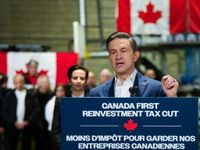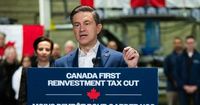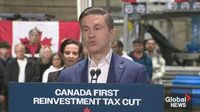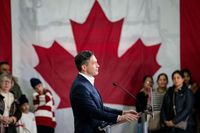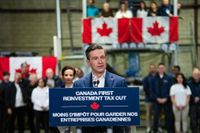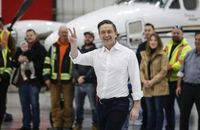Conservative Leader Pierre Poilievre is making bold promises as the federal election campaign heats up, declaring that a Conservative government would allow Canadians to defer capital gains taxes on earnings reinvested in domestic companies. Speaking at a plastics manufacturing plant in North York, Toronto, on March 30, 2025, Poilievre described this tax deferral as "rocket fuel" for the Canadian economy, aiming to stimulate investment and foster growth.
Under Poilievre's proposal, individuals and businesses selling assets such as shares and real estate would not have to pay capital gains taxes if the profits are reinvested within Canada. This measure is set to take effect on July 1, 2025, and would remain in place until the end of 2026. The Conservative Party estimates that this policy could cost the government approximately $5 billion in lost revenue during its first year and about $5.5 billion in the following year. However, the taxes would still be owed when investors cash out or move their funds outside of Canada.
Poilievre criticized the current capital gains tax regime, which he claims deters investment in new tools, technology, and infrastructure. "As a result, our wages are down, our people cannot pay their bills, and we are more dependent on the Americans than ever before," he stated. By allowing a tax deferral, he believes that more Canadians would be encouraged to sell old assets and reinvest in new ventures, ultimately benefiting the economy.
The Conservative leader's announcement comes at a time when his party is facing internal pressures and slipping in public opinion polls. Recent reports indicate that some party members are urging Poilievre to shift focus from attacking the Liberal government to addressing the economic threats posed by U.S. President Donald Trump, particularly in light of Trump's recent threats regarding automotive tariffs.
In addition to his tax proposal, Poilievre has been vocal in calling for the disqualification of Liberal candidate Paul Chiang, who recently faced backlash for suggesting that a Conservative candidate could be turned over to Chinese authorities for a bounty. Chiang's comments regarding Joe Tay, a Conservative candidate charged under Hong Kong's controversial National Security Law, have drawn widespread condemnation. Poilievre described Chiang's remarks as "incredible" and questioned Liberal Leader Mark Carney's judgment in allowing him to remain on the ballot.
As the election campaign progresses, Poilievre has also targeted New Democratic Party (NDP) ridings that may be vulnerable, especially as polls indicate a decline in NDP support. The Conservative Party's strategy appears to be focused on capitalizing on this shift while simultaneously addressing the Liberal Party's recent resurgence.
During his campaign, Poilievre has emphasized the importance of Canadian investment, stating that the proposed capital gains tax deferral would allow companies to reinvest profits into domestic growth. He believes that this policy would help reverse the trend of declining investment and per capita GDP that he attributes to what he calls the "lost Liberal decade" since Justin Trudeau's election.
In a broader context, the Conservative leader's tax plan is also seen as a response to the Liberal government's previous proposal to increase the taxable portion of capital gains from 50% to 66.67%. However, this increase was recently canceled by Carney, who is now facing scrutiny for his handling of the situation.
As Poilievre travels across Canada to rally support, he aims to position his party as the best choice for Canadians looking for economic stability and growth. The Conservative leader's promise of tax reforms is part of a larger narrative that seeks to reassure voters that his party can effectively manage the economy in the face of external challenges, particularly from the United States.
With the election date approaching, Poilievre's tax proposal and his stance on foreign interference in Canadian politics will likely play a significant role in shaping the campaign landscape. As voters weigh their options, the Conservatives are betting that their focus on domestic investment and economic growth will resonate with Canadians who are feeling the pinch of rising costs and economic uncertainty.
Meanwhile, the Liberal party is grappling with its own challenges, including pressure to remove Chiang from the ballot and manage the fallout from his controversial comments. The political climate is charged, with both parties jockeying for position as they head into the final stretch of the campaign.
As the election campaign unfolds, it remains to be seen how these issues will influence voter sentiment and whether Poilievre's promises will translate into electoral success. With key rallies and events planned in the coming days, the Conservatives are poised to make their case to Canadians while navigating the complexities of a competitive political landscape.
